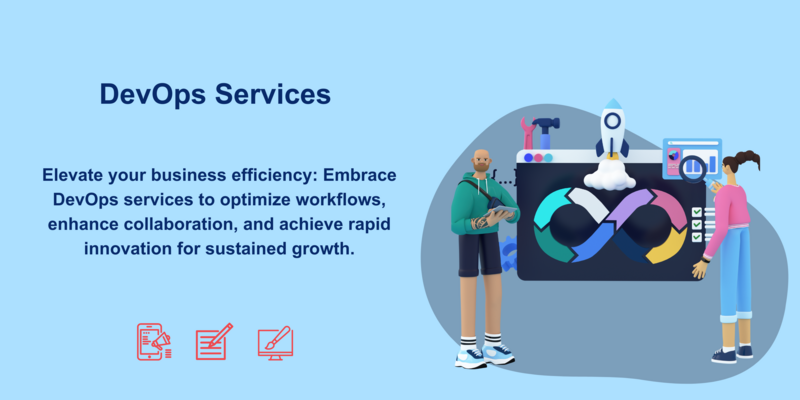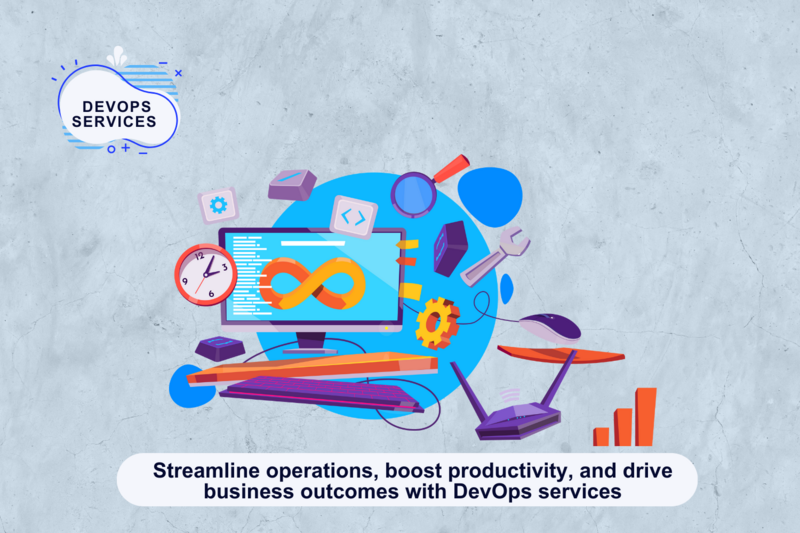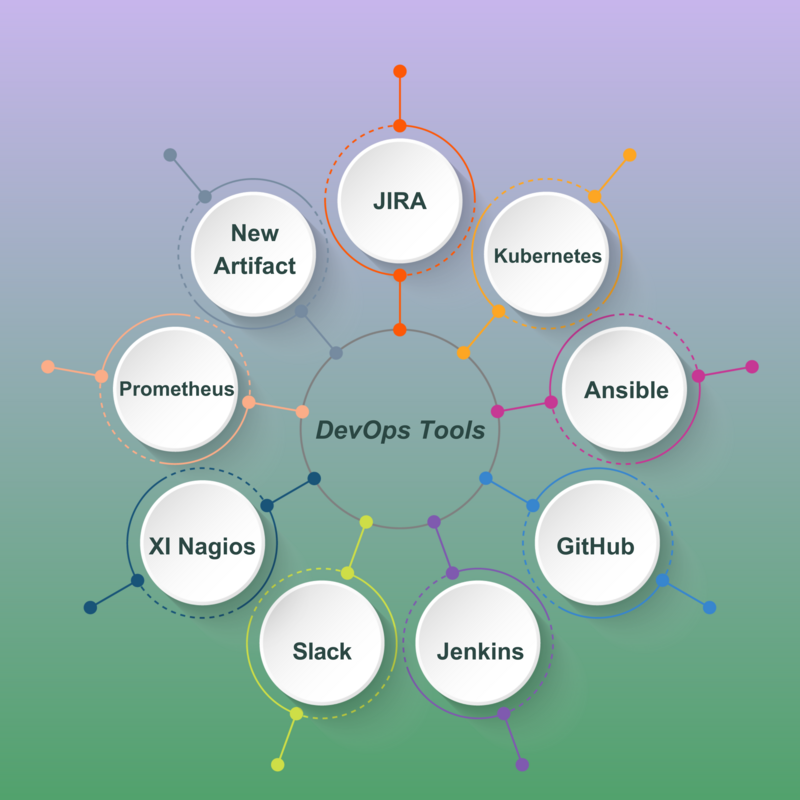In today's fast-changing digital landscape, organizations continually seek methods to improve software development and delivery efficiency, productivity, and quality. This is when DevOps enters the picture. DevOps, which combines action and operations, provides a comprehensive approach to software development that emphasizes collaboration, automation, and continuous improvement. Organizations can achieve long-term success by optimizing procedures, minimizing errors, and delivering software faster and with higher quality by following DevOps best practices. This article will examine some of the essential DevOps best methods for increasing efficiency and quality.
What Is DevOps?
 DevOps is a software development process that prioritizes cooperation, communication, and integration among software engineers and IT operations specialists. The goal is to automate and optimize the software development process to boost efficiency and improve software delivery quality. Continuous integration and delivery, infrastructure as code, monitoring, and logging, and communication between development and operations teams are all examples of DevOps methods. By implementing these techniques, companies can increase their capacity to provide software to customers faster, respond to customer requests more rapidly, and make their systems more dependable and perform better.
DevOps is a software development process that prioritizes cooperation, communication, and integration among software engineers and IT operations specialists. The goal is to automate and optimize the software development process to boost efficiency and improve software delivery quality. Continuous integration and delivery, infrastructure as code, monitoring, and logging, and communication between development and operations teams are all examples of DevOps methods. By implementing these techniques, companies can increase their capacity to provide software to customers faster, respond to customer requests more rapidly, and make their systems more dependable and perform better.
DevOps is a collection of cultural beliefs, processes, and technologies that can be used to introduce new product versions to the market. In addition, it aids in the improvement of the release process by making it easier to build goods faster, allowing you to get more done.
By leveraging feedback loops, you may provide better customer service, improve the efficiency of your infrastructure, and crowdsource quality control.
How can DevOps improve software quality and reliability?
The following practices can be implemented with DevOps services to increase software quality and reliability:
Adopt a Collaborative Culture
Fostering a culture of collaboration and breaking down walls between development, operations, and other teams participating in the software development lifecycle is one of the critical ideas of DevOps. Encourage open communication, shared responsibilities, and cross-functional collaboration to promote understanding, efficiency, and quality outcomes. Creating a collaborative environment where teams collaborate toward a single goal is critical for long-term DevOps success.
Automate Everything That Is Possible
Automation is key to DevOps approaches. Organizations may drastically minimize human error, enhance productivity, and speed up software delivery by automating repetitive and manual operations. Code deployments, infrastructure provisioning, testing, and monitoring are examples of automated procedures. Implementing robust automation frameworks and leveraging technologies for configuration management, continuous integration, and continuous deployment helps assure consistent and dependable results while allowing for faster feedback loops and issue resolution.
Continuous integration and deployment should be implemented
DevOps approaches rely heavily on continuous integration (CI) and continuous deployment (CD). CI entails regularly integrating code changes from various developers into a shared repository. This method aids in the early detection of integration issues, enhances code quality, and maintains a stable codebase. CD, on the other hand, concentrates on automating application deployment in production settings. As a result, organizations can achieve faster time to market, reduce deployment errors, and provide new features and bug fixes more frequently by automating the build, testing, and deployment processes.
Continuous testing should be prioritized
Quality is an unavoidable component of software development, and constant testing is essential. DevOps stresses a shift-left testing approach, in which testing is integrated early in development. For example, Unit, integration, and regression tests can be integrated into the CI/CD process to offer quick and reliable feedback on code quality. Furthermore, creating a stable test environment and leveraging tools for test automation, performance testing, and security testing will help ensure that software releases are thoroughly tested before unleashing them to the public.
Performance should be monitored and measured
Continuous monitoring and performance measurement are critical to driving DevOps efficiency and quality. Organizations can obtain insights into their applications' performance, availability, and reliability by adopting monitoring tools and defining valuable metrics. Real-time monitoring enables the prompt discovery and repair of faults, ensuring the program runs at peak performance. Monitoring also provides information for capacity planning, resource optimization, and future improvements. Monitoring offers continuous feedback, allowing firms to develop and enhance their software based on authentic usage patterns and consumer feedback.
Organizations may increase the quality and dependability of their software, reduce downtime, and make consumers happier by implementing these DevOps principles. To develop a DevOps culture in your firm, employ DevOps standards to make it easier to deploy pipelines and multiple environments, and keep a watch on how it is used and how security is handled.
Services Provided by Multiple Clouds
The more complicated and comprehensive your company's infrastructure is, the more complex the transfer to the cloud will be. Choose a cloud migration consulting partner to help you move your data while retaining security and scalability. Here are a few examples of popular multi-cloud services:
- Hybrid cloud administration
- Cost reduction across many clouds
- Security and compliance across many clouds
- Migration and deployment of multi-cloud applications
- Data management and integration across several clouds
The advantages of DevOps services in digital transformation
DevOps services provide various advantages for businesses trying to streamline their digital transformation initiatives. For example, DevOps can improve cooperation, reduce time to market, and increase efficiency by merging software development and IT operations. Furthermore, DevOps can assist firms in better managing their infrastructure, automating processes, and improving overall quality. With these advantages, it's no surprise that DevOps has emerged as a critical component of successful digital transformation programs.
Improved coordination between development and operations teams is one of the primary advantages of DevOps services. DevOps can help teams collaborate more effectively and efficiently by breaking down silos and increasing cross-functional collaboration. This can result in a shorter time to market for new products and services and better quality and dependability. DevOps can also assist firms in automating operations and managing their infrastructure more effectively, lowering the risk of downtime and other difficulties. As a result, DevOps services can help firms achieve their digital transformation goals while remaining competitive in today's fast-paced business climate.
Increased agility and flexibility are other advantages of DevOps services. Organizations that use a DevOps model can respond more swiftly to changing market conditions, and consumers can react more swiftly to changing market conditions and consumer needs. In addition, because DevOps stresses continuous delivery and deployment, teams can release new features and upgrades more frequently and confidently. This can help firms remain ahead of the competition and better meet their customers' changing requirements. DevOps can also help firms cut costs by streamlining processes and resources, increasing efficiency, and reducing waste. Overall, DevOps services can offer a variety of advantages to firms trying to modernize their digital operations and stay competitive in today's quickly changing business market.
How DevOps services may help your business
 DevOps services can help you improve your processes in a variety of ways. For example, DevOps can increase collaboration and communication by busting down silos between development and operations teams, resulting in faster and more efficient development cycles. Automation technologies can also help firms eliminate human errors and enhance overall quality, while infrastructure management solutions can help organizations manage their resources and grow more effectively. DevOps services can help firms accomplish their digital modification goals and stay ahead of the competition by providing these advantages.
DevOps services can help you improve your processes in a variety of ways. For example, DevOps can increase collaboration and communication by busting down silos between development and operations teams, resulting in faster and more efficient development cycles. Automation technologies can also help firms eliminate human errors and enhance overall quality, while infrastructure management solutions can help organizations manage their resources and grow more effectively. DevOps services can help firms accomplish their digital modification goals and stay ahead of the competition by providing these advantages.
Improved coordination between development and operations teams is one of the primary advantages of DevOps services. DevOps can help organizations collaborate more effectively and efficiently by breaking down silos and boosting cross-functional teams. This can result in shorter development cycles and improved team communication and cooperation. Furthermore, automation tools can help eliminate human errors and increase overall quality, whereas infrastructure management solutions can help firms manage their resources and grow more effectively. DevOps services can help firms accomplish their digital transformation plans and stay ahead of the contender by providing these advantages.
DevOps services can also help firms enhance their processes by fostering a culture of continuous improvement. Teams can find areas for improvement and execute changes to optimize their operations by regularly evaluating and analyzing performance indicators. This can result in enhanced efficiency, lower costs, and higher customer satisfaction. Furthermore, DevOps services can assist firms in adopting new technologies and techniques more swiftly, allowing them to stay along the curve and be competitive in a continuously changing market. Overall, DevOps services provide various benefits that can assist firms in improving their operations and achieving their business objectives.
Platforms and tools for DevOps
The DevOps process is based on the use of tools that aid in the simplification of the software development process. They automate manual operations, help teams manage them, and build complex environments at scale. DevOps also facilitates collaboration among software engineers, product managers, and operations specialists.
The best DevOps tools in 2023
 JIRA
JIRA
The most popular project management tool enables teams to quickly manage, plan, and release software by authoring user stories, problems, and tasks and utilizing its reporting tools. It also contains scrum and Kanban boards that development teams may use immediately.
Kubernetes
Kubernetes (K8) is a free, open-source platform for managing and deploying containerized applications and services. It is an excellent tool for managing a wide range of containers in a complex context, such as when you have hundreds of them and different team members maintain them.
Ansible
Ansible is another open-source DevOps solution for managing configurations and automating deployments. Automation helps reduce the time required to set up CI/CD pipelines.
GitHub
GitHub is used to handle software development as well as version control. It can generate code iterations quickly without committing entire files at once. It facilitates speedy debugging and rewriting of difficult sections of code.
Jenkins
Jenkins is a DevOps automated solution that may assist you in automating various phases of your CI/CD workflow by adapting it to your needs.
Slack
Slack is more than simply a tool for communicating with team members; it also allows you to track your team's progress. Leads can be created or managed using Slack. You can also generate reports to boost client engagement!
XI Nagios
It is a tool used within the DevOps framework to identify and fix infrastructure and network issues across all apps, networks, services, and vital infrastructure components for server systems and any desktop.
Prometheus
Prometheus is an open-source monitoring application that allows IT operations professionals and DevOps teams to do complex analytics utilizing server-based metrics by storing precise time-series data.
New Artifact
It is used to monitor application performance as well as infrastructure. It's a robust full-stack analysis tool that collects software-related logs, metrics, and events. It can also assist you in identifying anomalies, connecting messages from records and circumstances, and even creating a simulated version of your observed abnormalities to resolve them swiftly.
Automation's involvement in DevOps services
Automation is an essential component of DevOps services and can assist firms in streamlining their development processes. Teams can focus on more strategic work while decreasing the risk of human error by automating repetitive operations such as testing and deployment. Automation solutions can also enhance overall quality by ensuring consistency and shortening the time it takes to discover and correct problems. As a result, organizations that use the correct automation approach can achieve faster time-to-market and increase their overall competitiveness.
The best strategies for integrating DevOps into your organization
Implementing DevOps services in your firm can be a difficult task, but there are several best practices to follow to ensure success. First and foremost, all stakeholders, including leadership, development teams, and operations teams, must be on board. This helps assure that everyone is on the same page with the aims and advantages of DevOps and is dedicated to making it work. It is also critical to begin small and progressively scale up rather than attempting to apply DevOps throughout the entire firm at once. This can assist in reducing disturbance while allowing teams to learn and change as they go. Finally, it's critical to track and measure progress using metrics like deployment frequency, lead time, and mean time to recovery. This can assist in identifying areas for improvement and ensuring that the firm is reaping the full benefits of DevOps.
Prioritizing automation is another effective practice for developing DevOps services. Automation of testing, deployment, and monitoring activities can reduce errors and boost efficiency. It's also critical to cultivate a culture of cooperation and continuous improvement in which teams are encouraged to share expertise and collaborate to discover and solve problems. This can aid in breaking down silos and ensuring that everyone is working toward identical objectives. Finally, engaging in team member training and development is critical to ensure they have the skills and knowledge to build and manage DevOps services properly. By adhering to these best practices, firms may successfully use DevOps services and reap numerous benefits, such as quicker market time, greater quality, and increased agility.
Conclusion
DevOps involves a combination of technical approaches, cultural reform, and an unwavering focus on cooperation and continual improvement. Organizations can achieve long-term success in software development and delivery by adopting a DevOps approach, using automation, incorporating testing early in the development process, and monitoring performance. In addition, DevOps offers faster time to market, higher software quality, and higher customer happiness, putting enterprises at the forefront of digital innovation. You may set the path for a successful DevOps journey and reap the benefits of increased efficiency and quality in your software development processes by implementing the best practices suggested in this article.
Newsletter to recieve
our latest company updates
Comment